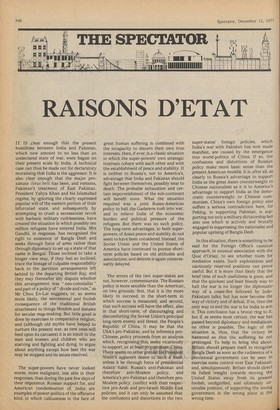RAISONS D'ETAT
IT IS ,clear enough that the present hostilities between India and Pakistan, which now amount to no less than an undeclared state of war, were begun on their present scale by India. A technical case can thus be made out for declaratory moralising that India is the aggressor. It is also clear enough that the major proximate 66sus belli has been, and remains, Pakistan's treatment of East Pakistan. President Yahya Khan and his Islamabad regime, by ignoring the clearly expressed popular will of the eastern portion of their bifurcated state, and subsequently by attempting to crush a secessionist revolt with barbaric military ruthlessness, have created the situation in which possibly ten million refugees have entered India. Mrs Gandhi, in response, has recognised the right to existence of Bangla Desh and seeks through force of arms rather than through diplomacy to set up a state of that name in Bengal. Those inclined to take a longer view may, if they feel so inclined, trace the lineage of culpable responsibility back to the partition arrangements left behind by the departing British Raj; and they may thereafter idly dispute whether this arrangement was " neo-colonialist " and part of a policy of" divide and rule," as Mr Chou En-Lai suggests, or, as seems more likely, the sentimental and foolish consequence of the traditional British attachment to things Moslem and distaste for secular map-making. But little good is done by exercises in comparative religion; and (although old myths have helped to nurture the present war, as new ones will feed upon its carcases) it is an insult to the men and women and children who are starving and fighting and dying, to argue about anything except how best the war may be stopped and its issues resolved.
The super-powers have never looked worse, more malignant, less able in their responses, than during the past few days of their impotence. Russian support for, and American condemnation of, India are examples of power-politics of the offensive kind, in which callousness in the face of great human suffering is combined with the incapacity to discern their own true interests. Here, if ever, is a classic situation in which the super-powers' own strategic interests cohere with each other and with the establishment of peace and stability. It is neither to Russia's, nor to America's, advantage that India and Pakistan should fight between themselves, possibly near to death. The probable exhaustion and certain impoverishment of the sub-continent will benefit none. What the situation required was a joint Russo-American policy to halt the Gadarene rush into war, and to relieve India of the economic burden and political pressure of the refugees. But there was no such policy. The long-term advantages, to both superpowers, of Asian peace and stability do not seem to have been considered. Instead, the Soviet Union and the United States of America have continued to pursue shortterm policies based on old attitudes and associations; and detente is again unnecessarily delayed.
The errors of the two super-states are not, however, commensurate. The Russian policy is more sensible than the American, on two grounds: first, that it is the more likely to succeed, in the short-term in which success is measured; and second, that such success will have the effect, also in that short-term, of discouraging and discomforting the Soviet Union's principal long-term enemy and threat, the People's Republic of China. It may be that the USA's pro-Pakistan, and by inference proChinese, policy proceeds from an analysis which, recognising this, seeks vicariously to support, or at least to conciliate, China. There seems no other ground few President Nixon's apparent desire to back i loser, unless it be through force of presidential Asiatic habit. Russia's anti-Pakistan and therefore anti-Moslem policy, and America's pro-Pakistan and therefore proMoslem policy, conflict with their respective pro-Arab and pro-Israeli Middle East policies; and it can only be assumed that the confusions and distortions in the two super-states' foreign policies, which India's war with Pakistan has now made manifest, are caused by the emergence into world-politics of China. If so, the confusions and distortions of Russian policy make more basic sense than the present American muddle. It is, after all, as clearly to Russia's advantage to support India as the great Asian counterweight to Chinese nationalism as it is to America's advantage to support India as the democratic counterweight to Chinese communism. China's own foreign policy also suffers a serious contradiction here, for Peking, in supporting Pakistan, is supporting not only a military dictatorship but also one which is actively and brutally engaged in suppressing the nationalist and popular uprising of Bangla Desh.
In this situation, there is something to be said for the Foreign Office's cautious approach, in unusual association with the Quai d'Orsay, to see whether room for mediation exists. Such explorations and cautiously reserved positions can prove useful. But it is more than likely that the brief time of such usefulness is gone; and that the quickest and least bloody way to halt the war is no longer the diplomatic way of a cease-fire followed by IndoPakistani talks, but has now become the way of victory and of defeat. If so, then the only way to end the war is for India to win it. This conclusion has a brutal ring to it but if, as seems most certain, the war has passed beyond diplomacy and mediations, no other is possible. The logic of the situation is, thus, that the victory be hastened so that the suffering be not prolonged. To help to bring this about, Britain should prepare itself to recognise, Bangla Desh as soon as the rudiments of a provisional government can be seen to exercise some control over East Pakistan; and, simultaneously, Britain should direct its fullest weight towards moving the United States away from its present foolish, undignified, and ultimately untenable position, of supporting the wrong government in the wrong place at the wrong time.










































 Previous page
Previous page